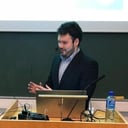It was my third year at JSSATE Noida, a tier-3 engineering college in India. Like many students in similar institutions, I often felt a gnawing uncertainty about opportunities. We didn’t have the same industry exposure, robust alumni networks, or the immediate awareness of programs that students in top-tier colleges often enjoyed. For me, “having no choice” meant I had to do something different, something significant, to stand out.
That “something different” became Google Summer of Code (GSoC).
At that time, I didn’t know anyone personally who had done it. But I was fascinated — here was a program where students from across the globe worked remotely on meaningful open-source projects under the mentorship of professionals. And it came with a generous stipend too. Most importantly, it promised something I craved more than anything else: a chance to prove myself on a global platform.
What is Google Summer of Code, and Why Should You Care?
Google Summer of Code is a global, remote program that introduces students to open-source software development. Over a 10–12 week period during their summer break, students contribute to real-world open-source projects under the guidance of experienced mentors.
But here’s the thing: GSoC is not just another internship.
For students in colleges that lack strong placement pipelines or meaningful internships, GSoC becomes a career-shaping milestone. It gives you:
- A crash course in real-world software development
- Deep experience with version control, collaborative workflows, and distributed teams
- Mentorship from senior developers in respected open-source communities
- A massive confidence boost and visibility to the global developer ecosystem
- A stipend (I received $5,500), which helped me pay off part of my education loan
And let’s not forget: completing GSoC is a huge resume booster. Recruiters know it’s not easy to get selected. It signals that you’re proactive, skilled, and able to contribute meaningfully to large, ongoing codebases.
The Common Myth: “GSoC is Only for Elite College Students”
Let me bust this once and for all.
I wasn’t from an IIT or IIIT. I didn’t have seniors guiding me. I didn’t have placement training or special privileges. What I had was an internet connection, curiosity, and a hunger to break out of the cycle. GSoC is one of the most meritocratic programs out there — your selection is based on your work, not your college name.
If I could do it, so can you.
My GSoC Journey: A Strategy Born of Necessity
Once I discovered GSoC, I set a singular goal: get selected. But I knew that just “wanting it” wouldn’t be enough — I needed a strategy. I broke my journey down into key phases:
1. Early and Consistent Contributions
This was the foundation. I didn’t wait for the application period to open. Instead, I began contributing to open-source organizations months in advance.
Why?
Because I needed to:
- Understand how real-world open-source projects worked
- Learn Git workflows, branching, pull requests, and code review etiquette
- Get familiar with mailing lists, issue trackers, and build systems
- Make my name familiar to the mentors and contributors in the community
Here’s a glimpse into my activity:
- 2016: 1,092 GitHub contributions
- 2017: 732 GitHub contributions
These weren’t random. Every commit was a step forward — fixing bugs, writing documentation, resolving “good first issues,” and even asking thoughtful questions.
2. Choosing the Right Organization
I didn’t apply to 10 organizations. I focused on just one that truly aligned with my interests: FOSSASIA.
Why FOSSASIA?
- Active and welcoming community
- Clear project ideas and GSoC history
- Tech stack that matched my strengths
- Mentors who were responsive
A key tip: genuine interest in the organization’s work will keep you motivated during the long weeks of summer coding. Don’t chase “fancy names.” Pick a project that excites you.
3. Contributing the Right Way
Don’t just “dump code.” Open-source is collaborative. I made sure I:
- Started small — focused on documentation or “good first issues”
- Communicated clearly in public forums (IRC, GitHub, mailing lists)
- Asked smart questions — showing what I tried, what I didn’t understand
- Responded quickly and respectfully
- Proposed improvements beyond the issue tracker
Mentors aren’t just looking for great coders — they’re looking for good collaborators. Be someone they’d want on their team.
4. Crafting a Standout Proposal
Your proposal is the final test. It shows whether you understand the project and have a plan to deliver.
Here’s what I included:
- A clear problem statement
- My background and relevant skills
- Timeline split into weeks
- Milestones with deliverables
- Risk mitigation (what if something goes wrong?)
- Links to my past contributions
Before submission, I took feedback from mentors, tweaked it, and polished it like I was applying for a job. Because honestly, I was.
The Result: Selection, Confidence, and Much More
When the GSoC selections were announced and I saw my name — I won’t lie — I cried a little. It was validation of months of hard work.
That summer, I worked on [insert project name if you'd like], contributed code that went live, collaborated with mentors from around the world, and became a part of the open-source community.
Beyond the stipend, beyond the resume, what I gained most was belief. I wasn’t “just a student from a tier-3 college” anymore. I was an open-source contributor — a developer who had made a global impact.
Timeless Advice for Aspiring GSoC Applicants
Even though GSoC has evolved (it now welcomes contributors beyond students too), these principles remain evergreen:
✅ Start early — months before the application window ✅ Be consistent — small contributions matter ✅ Focus your efforts — 1-2 organizations, not 10 ✅ Be active in the community — not just a silent coder ✅ Master the tools — Git, GitHub, the tech stack ✅ Write a great proposal — and revise it based on feedback ✅ Be patient and persistent — rejection is not the end
A Word to My Fellow Tier-2/3 Students
Don’t let your college define your ambition. Your circumstances might not be ideal — I get it. But the world of open source doesn’t care where you study. It cares about what you do.
You can build your reputation, sharpen your skills, and unlock global opportunities from your dorm room, your PG, your home.
All it takes is one shot — and the courage to take it.
Want Help with Your GSoC Journey?
I now mentor aspiring GSoC applicants who want personalized guidance — whether it’s shortlisting organizations, contributing effectively, or drafting a proposal.
If you’re serious about cracking GSoC, I’d love to help: 👉 Book a session with me on MentorCruise
Let’s make your GSoC dream a reality.
Start small. Stay consistent. Believe in yourself. The open-source community is waiting for you.







